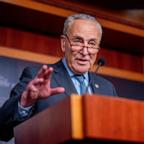Kids and Sports: No Vacation
Sept. 10, 2001 — -- For many students participating in sports, fall isn't necessarily the first time they've stepped onto the playing field since school let out. A majority of athletes have been practicing for months under the hot summer sun.
But a rash of recent deaths attributed to working out in the heat, most prominently Minnesota Vikings offensive lineman Korey Stringer, has sparked a debate among experts over whether children should be pushed to train over the summer.
"These days, there is no real vacation or off-season from a sport," says Dr. Gregory Stewart, Chief of Physical Medicine and Rehabilitation, and Team Physician for Tulane University. "During the summer almost all schools leave their weight rooms open for the football players to work out in. There are also conditioning workouts and other activities going on.
"This goes on at the professional, collegiate, and high school levels, and at times even junior high school levels," he adds.
Sports medicine experts agree that it's smart for fall athletes to shape up on their own beforehand.
"I'd hate to see a kid that's inactive for a couple of months and be asked to perform in the fall, especially in front of coaches and friends," says Avery Faigenbaum, associate professor of exercise physiology at University of Massachusetts in Boston. "It's a setup of failure emotionally and physically, and puts them at risk for injury."
Dr. Lyle Micheli, director of sports medicine at Children Hospital in Boston, agrees, but advises athletes to exercise caution while participating in a pre-season workout routine.
"Six to eight weeks before the season starts, kids should start some kind of activity, two to three days per week," Micheli says. "Conditioning-wise, we have a 10 percent rule, whereby you increase the volume of your workout by 10 percent each week."
Observers say children are being pushed harder to succeed at sports. With all of the athletic scholarships available to both boys and girls, parents often translate their child's athletic achievements into a free ride to college.
"It is my impression that this early specialization, early evaluation and recruitment, and intense summer programs seem to be much more common for high school and middle school students than it did before," says Dr. Leonard Rappaport, Director of the Developmental Medicine Center at Children's Hospital in Boston.
"Kids and teens are being pushed harder," Faigenbaum says. "Days and the amount of time kids spend training is going up and up, and ages are getting lower and lower."
While exercise does a body good, some experts question whether children should sacrifice quality time with their family for sports.
"It shouldn't be either/or, vacation is very important," says Dr. Eugenia Marcus, President of the Massachusetts Chapter of the American Academy of Pediatrics. "It's a time when families bond, when they travel and see other parts of the country, when they take a break from their regular routine."
Faigenbaum encourages children to have fun and be active, but not to the extreme.
"Early sports specialization is now being discouraged," he says. "You can be the best field hockey player at seven years old, but that does not relate to your performance down the road. We need to expose kids to a variety of physical activities."




